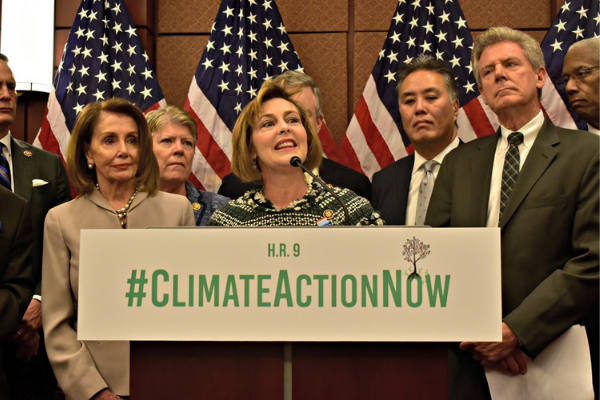Chair Kathy Castor Introduces Climate Action Now Act (H.R. 9) to Ensure U.S. Meets Climate Goals
Today U.S. Rep. Kathy Castor (FL14), Chair of the Select Committee on the Climate Crisis, continued her career-spanning fight for a clean and healthy environment, clean energy jobs and promoting environmental justice in Tampa Bay and around the country by leading her colleagues in introducing H.R. 9, the Climate Action Now Act. The legislation demands action on the climate crisis by ensuring America honors its Paris Agreement commitments and laying the groundwork for further action.
“I am proud to be chairing the Select Committee on the Climate Crisis and I am honored to introduce H.R. 9, the Climate Action Now Act,” U.S. Rep. Castor said. “It was with America’s leadership and engagement that so many nations committed to climate action in the international Paris Agreement. Despite what President Trump has said, America cannot and will not retreat. We will keep our commitments to fight the climate crisis. This is just the start of action by House Democrats in this Congress.”
 On December 12, 2015, nearly 200 countries, including the United States, China, India and the European Union signed the landmark Paris Agreement to combat climate change and to accelerate and amplify the actions and investments needed for a sustainable low carbon future. On June 1, 2017, President Trump announced his intention to withdraw the United States from the Paris Agreement – making our country the only one to reject the global pact.
On December 12, 2015, nearly 200 countries, including the United States, China, India and the European Union signed the landmark Paris Agreement to combat climate change and to accelerate and amplify the actions and investments needed for a sustainable low carbon future. On June 1, 2017, President Trump announced his intention to withdraw the United States from the Paris Agreement – making our country the only one to reject the global pact.
The Climate Action Now Act would prohibit any federal funds from being used to take any action to advance the withdrawal of the United States from the Paris Agreement. The legislation would also call on President Trump to develop and make public a plan for how the United States will meet the pollution reduction goals submitted to the world in 2015. He has an obligation to lead on this issue and to help our nation achieve our commitment of an economy-wide reduction in carbon pollution by between 26%-28% below 2005 levels by 2025.
“We can create millions of good-paying clean energy jobs right now,” U.S. Rep. Castor continued. “We can save billions of dollars in energy costs for working people right now. We can finally address decades of environmental injustice right now. And we can respond to the incredible groundswell of activism from young people who are demanding climate action now as well. They are the first generation to grow up in the climate crisis. Now they are demanding the chance to be the generation that solves it.”
A recent Brookings Institute report showed that southern metropolitan areas will be hit hardest in the United States by climate change in the form of coastal property damage and higher mortality, with regions in Florida like Tampa representing eight of the 10 most adversely affected large metros. They found that Tampa’s economy could contract by 16.8 percent by the end of the century from direct climate change impacts. The effects of climate change can already be felt in Tampa and throughout Florida: rising tidal levels and temperatures, sunny day flooding, disappearing corals and longer mosquito seasons.
“Speaking as a Floridian who boarded up and fled my home with my family as Hurricane Irma spun its destructive winds and storm surge towards my hometown a year and a half ago, I understand we must act with urgency on the climate crisis,” U.S. Rep. Castor concluded. “The Climate Action Now Act will help us carry out our moral obligation to future generations to tackle this crisis now.”
Text of the Climate Action Now Act can be found here.
Video of U.S. Rep. Castor’s comments can be found here.
###
